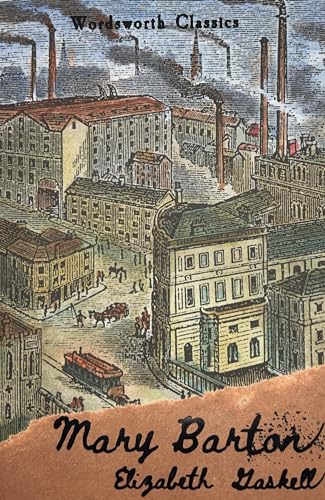Mary Barton (Wordsworth Classics)
Elizabeth Cleghorn Gaskell
BOOK REVIEW

In the throes of industrial revolution-era England, Mary Barton unfolds a tale so rich in passion, heartache, and the stark divide between social classes that it will grip you by the throat and not let go. Elizabeth Cleghorn Gaskell, with her intricate prose, invites you into the lives of a working-class family in Manchester-an arena where love battles economic despair, and survival hangs by a delicate thread woven from hope and despair.
At the story's core is Mary Barton, a young woman grappling with her own emotions while ensnared in the harsh realities of the mill town. Her life embodies the struggle of the oppressed, and as you delve into her world, the air thickens with the scent of coal and the bitterness of class warfare. Gaskell doesn't just tell a story; she transforms you into an observer in the grimy streets, where the cries of children mingle with the clank of machinery, and love blooms amidst the suffocating tension of poverty.
Readers have been divided on Gaskell's presentation of her characters; some laud her for creating profound, relatable personas while others criticize the melodrama that sometimes seems to eclipse the story's severity. However, many agree that Gaskell's ability to capture the human spirit in the face of unimaginable hardships is nothing short of extraordinary. This author, an intimate observer of her society, lived at a time when the rate of urbanization brought about drastic changes-families crammed into shabby tenements while the rich grew richer and the poor turned desperate. Through Mary's eyes, we witness the dissolution of dreams against the backdrop of societal neglect.
Each page unfurls emotional layers, like peeling an onion. You'll find yourself chuckling at the absurdity of love, brimming with rage over the injustices faced by workers, and sobbing over intimate losses. The moral inquiries posed through Mary's choices and agonies challenge you to ponder the broader implications of your own life choices. "What would I do in her place?" you may ask, fully aware that this tale is steeped in a time far removed from ours yet alarmingly relevant today-just as socio-political issues continue to polarize our own society.
Critics have pointed to the contrasts between Mary and her male counterparts-namely the noble but flawed character of Jem Wilson and the wealthy yet soulless Harry Carson-as a tool for Gaskell to explore the limitations placed on women in a male-dominated world. This dichotomy sparks a fiery debate among readers: does Gaskell's portrayal empower or inadvertently constrict her heroine? Yet, amid this complexity lies a burgeoning call for compassion and understanding, transcending time and place.
Beyond the characters, Mary Barton is a microcosm of the larger societal struggles. It's not merely a tale of love against all odds; it's a stark reminder of the disparities that continue to exist in our world. Gaskell's eye for social commentary ignites a spark that demands we reassess our roles within our communities. Who are we to turn a blind eye to the struggles of others?
So, do not just skim through the pages. Allow Gaskell to drag you through the mud and mire of 19th-century life as you witness the blood, sweat, and tears of those who lived and loved on the brink of survival. This book is not merely a relic of literary significance; it is a call to arms for empathy, urging you to dive deep into the human experience. In the end, reading Mary Barton is not just an intellectual exercise-it's an emotional journey that leaves lasting impressions on your heart and mind. Don't miss out on this transformative experience; your heart will thank you later.
📖 Mary Barton (Wordsworth Classics)
✍ by Elizabeth Cleghorn Gaskell
🧾 448 pages
2012
#mary #barton #wordsworth #classics #elizabeth #cleghorn #gaskell #ElizabethCleghornGaskell